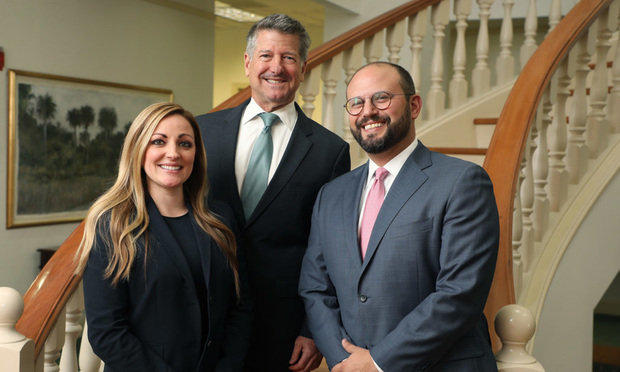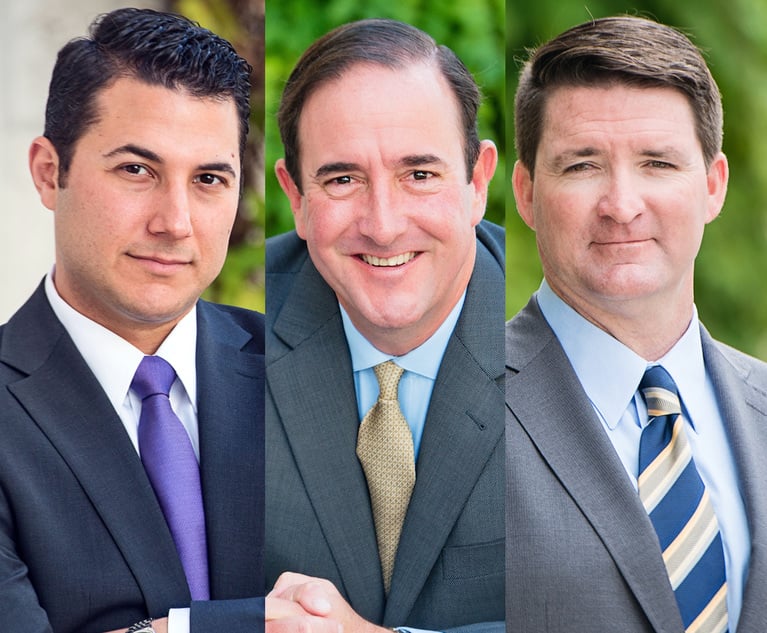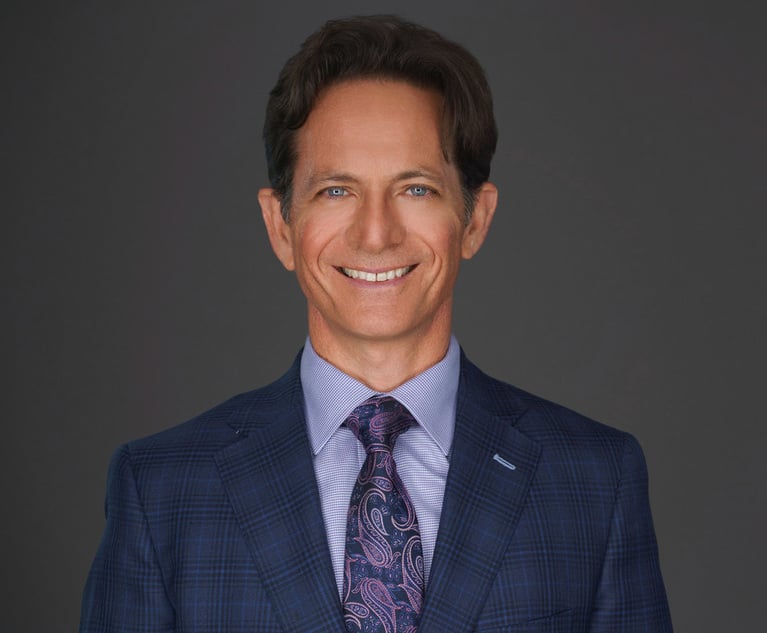'All Our Clients Are Gone': How South Florida Lawyers Hit Big Tobacco With Bittersweet $37M Verdict
"There's really no more cutting-edge and important industry to hold accountable for misdeeds than the tobacco industry," said Jonathan Gdanski of the Schlesinger Law Offices, who worked with Brittany Chambers and Steven Hammer to land a $37 million victory against cigarette-makers R.J. Reynolds and Philip Morris.
March 18, 2019 at 11:44 AM
7 minute read
 Brittany Chambers (from left), Steven J. Hammer and Jonathan R. Gdanski of Schlesinger Law Offices, Fort Lauderdale. (Photo: J. Albert Diaz/ALM)
Brittany Chambers (from left), Steven J. Hammer and Jonathan R. Gdanski of Schlesinger Law Offices, Fort Lauderdale. (Photo: J. Albert Diaz/ALM)
Attorneys at the Schlesinger Law Offices in Fort Lauderdale convinced a jury to award $25 million in punitive and $12 million in compensatory damages to the family of Rita Mahfuz, who died of lung cancer after a lifetime of smoking R.J. Reynolds and Philip Morris cigarettes.
Steven J. Hammer, Brittany Chambers and Jonathan R. Gdanski argued that the tobacco giants used misleading ads to prey on people like Mahfuz, who was just 13 years old when she picked up her first pack.
Mahfuz's husband, Richard, sued after she died at 53—a young age to have lung cancer and chronic obstructive pulmonary disease, a lung disease that blocks airways and causes wheezing.
According to Gdanski, it was crucial to find jurors able to keep an open mind and to essentially “relearn” what they think they know about the tobacco industry.
“Everybody comes in to these tobacco cases knowing a little bit about cigarettes, and they think they know a lot about smokers,” Gdanski said. “You have to have jurors who are able to listen to and understand the context of the evidence we're going to give them about a person they never met and a story they think they know about, but they don't really know, until we educate them about the internal workings of the tobacco industry.”
Kathryn S. Lehman and Jeffrey L. Furr of King & Spalding's Atlanta and Charlotte offices represented R.J. Reynolds, while Hildy Sastre of Shook, Hardy & Bacon in Miami represented Philip Morris. They did not respond to requests for comment before deadline.
Philip Morris and R. J Reynolds denied liability, arguing that Mahfuz's lung cancer wasn't directly linked to cigarettes and challenged the notion that she was addicted to smoking.
At trial, Hammer put on Dr. Robert Proctor, a world-renowned tobacco industry expert from Stanford University, to discuss how Big Tobacco's alleged conduct affected Mahfuz.
“He's lectured around the world about the tobacco industry, about the dangers of tobacco and about the conspiracy that they put together back in the '50s,” Hammer said. ”Obviously, the jury listened to what he had to say and understood what he had to say.”
Proctor's testimony linked Mahfuz with the companies' historic efforts to mislead the public—something he claimed continues today.
“Back then, they had ads that touted light cigarettes, low-tar cigarettes or filtered cigarettes,” Gdanski said. “Now they have ads that tout natural or additive-free cigarettes.”
Chambers brought in pulmonologist Dr. David Mannino, the country's leading expert on COPD, the respiratory disease from which Mahfuz suffered.
The defendants had no medical experts, which was unusual, according to Chambers. Instead, they challenged Mahfuz's medical diagnoses through their cross-examination of Mannino.
“They really put out doubt in the minds of the jurors and hoped that some of them would latch onto that,” Chambers said. “The jury was able to see through it, and that really made the verdict so powerful for us.”
Hammer, Chambers and Gdanski also submitted internal documents from the tobacco companies, which depicted high school students as the base of the business. According to Hammer, the papers showed that R.J. Reynolds and Philip Morris had studied 12-year-olds to understand their behaviors and what appeals to them.
“They targeted youth and continue to target youth,” Hammer said. “That's the nature of their business, and they recognized a long time ago that, without targeting the kids, they're not going to get smokers, because most smokers don't start as adults.”
She'd often smoked Winston cigarettes, owned by R.J. Reynolds Tobacco Co., and Virginia Slims, owned by Philip Morris USA Inc. So the team took aim at the brands' marketing schemes, dissecting old and new advertisements before the jury.
“Our client was a smoker ever since she was a kid, became addicted as a kid and basically became a tobacco company success story,” Hammer said. “That's what they thrive on.”
Cigarettes Live On
Rita Mahfuz' daughter explained to jurors that her mother is gone, but cigarettes are still here. For Gdanski, that was the most poignant moment of the trial.
“It synopsized the successful persistency of the enterprise in being able to continue to profit despite the fact that it's the only product that, when used as intended, kills more than half of the users,” Gdanski said. “Cigarettes are still here. All our clients are gone.”
Jurors found the defendants 90 percent at fault, delivering the $8 million and $4 million in compensatory damages Hammer asked for and landing just shy of the $30 million total punitive damages he'd suggested.
Though the $37 million verdict was a victory, it was a small one in Hammer's eyes.
“Ideally, we would love to be able to put [the defendants] out of business, but we unfortunately know that's never going to happen because they're just too powerful,” Hammer said. “These companies make $10 million to $15 million a day. So, in the scheme of things, it wasn't really much of a penalty to them.”
Richard Mahfuz was lost without his wife, according to Hammer, as they were childhood sweethearts.
“They didn't have much, but whatever they had they gave to their kids and made sure that they had a good life together,” Hammer said. “When they finally got to the age where they could retire, she died.”
Gdanski said there's nothing else like Big Tobacco's business model, which aims to put young “replacement smokers” where older, deceased smokers used to be.
“No industry in the history of America has hurt and killed more people and lied to the degree that the tobacco industry has,” Gdanski said. ”There's really no more cutting-edge and important industry to hold accountable for misdeeds than the tobacco industry, because it can send a message to other industries that, if you behave as a corporate citizen the way they did, then at some point, either through regulation or litigation, you can be held accountable.”
Case: Richard Mahfuz, representative of the estate of Rita Mahfuz v. R.J. Reynolds Tobacco Company and Phillip Morris USA Inc.
Case no.: 07-036743
Description: Engle progeny
Filing date: Dec. 28, 2007
Verdict date: Feb. 27, 2019
Judge: Broward Circuit Judge Sandra Perlman
Plaintiffs attorneys: Steven J. Hammer, Brittany Chambers, Jonathan R. Gdanski and Scott P. Schlesinger; the Schlesinger Law Offices; Fort Lauderdale
Defense attorneys: Kathryn S. Lehman and Jeffrey L. Furr; King Spalding; Atlanta and Charlotte; Hildy Sastre; Shook, Hardy & Bacon; Miami
Verdict amount: $37 million
More verdict stories:
South Florida Lawyers Land $8M Verdict Over Flea Market's 'Dangerous Patrons'
South Florida Lawyers Zap Bong Maker's $2M Trademark Claim
This content has been archived. It is available through our partners, LexisNexis® and Bloomberg Law.
To view this content, please continue to their sites.
Not a Lexis Subscriber?
Subscribe Now
Not a Bloomberg Law Subscriber?
Subscribe Now
NOT FOR REPRINT
© 2025 ALM Global, LLC, All Rights Reserved. Request academic re-use from www.copyright.com. All other uses, submit a request to [email protected]. For more information visit Asset & Logo Licensing.
You Might Like
View All
Automaker Pleads Guilty and Agrees to $1.6 Billion in Payouts

'I've Seen Terrible Things': Lawyer Predicts Spike in Hazing Suits

Florida Retention Ponds Scrutinized in Lawsuit After Latest Child Drowning
Trending Stories
- 1US Judge Dismisses Lawsuit Brought Under NYC Gender Violence Law, Ruling Claims Barred Under State Measure
- 24th Circuit Upholds Virginia Law Restricting Online Court Records Access
- 3Lawsuit Against Major Food Brands Could Be Sign of Emerging Litigation Over Processed Foods
- 4Fellows LaBriola LLP is Pleased to Announce that Alisha Goel Has Become Associated with The Firm
- 5Law Firms Turn to 'Golden Handcuffs' to Rein In Partner Movement
Who Got The Work
J. Brugh Lower of Gibbons has entered an appearance for industrial equipment supplier Devco Corporation in a pending trademark infringement lawsuit. The suit, accusing the defendant of selling knock-off Graco products, was filed Dec. 18 in New Jersey District Court by Rivkin Radler on behalf of Graco Inc. and Graco Minnesota. The case, assigned to U.S. District Judge Zahid N. Quraishi, is 3:24-cv-11294, Graco Inc. et al v. Devco Corporation.
Who Got The Work
Rebecca Maller-Stein and Kent A. Yalowitz of Arnold & Porter Kaye Scholer have entered their appearances for Hanaco Venture Capital and its executives, Lior Prosor and David Frankel, in a pending securities lawsuit. The action, filed on Dec. 24 in New York Southern District Court by Zell, Aron & Co. on behalf of Goldeneye Advisors, accuses the defendants of negligently and fraudulently managing the plaintiff's $1 million investment. The case, assigned to U.S. District Judge Vernon S. Broderick, is 1:24-cv-09918, Goldeneye Advisors, LLC v. Hanaco Venture Capital, Ltd. et al.
Who Got The Work
Attorneys from A&O Shearman has stepped in as defense counsel for Toronto-Dominion Bank and other defendants in a pending securities class action. The suit, filed Dec. 11 in New York Southern District Court by Bleichmar Fonti & Auld, accuses the defendants of concealing the bank's 'pervasive' deficiencies in regards to its compliance with the Bank Secrecy Act and the quality of its anti-money laundering controls. The case, assigned to U.S. District Judge Arun Subramanian, is 1:24-cv-09445, Gonzalez v. The Toronto-Dominion Bank et al.
Who Got The Work
Crown Castle International, a Pennsylvania company providing shared communications infrastructure, has turned to Luke D. Wolf of Gordon Rees Scully Mansukhani to fend off a pending breach-of-contract lawsuit. The court action, filed Nov. 25 in Michigan Eastern District Court by Hooper Hathaway PC on behalf of The Town Residences LLC, accuses Crown Castle of failing to transfer approximately $30,000 in utility payments from T-Mobile in breach of a roof-top lease and assignment agreement. The case, assigned to U.S. District Judge Susan K. Declercq, is 2:24-cv-13131, The Town Residences LLC v. T-Mobile US, Inc. et al.
Who Got The Work
Wilfred P. Coronato and Daniel M. Schwartz of McCarter & English have stepped in as defense counsel to Electrolux Home Products Inc. in a pending product liability lawsuit. The court action, filed Nov. 26 in New York Eastern District Court by Poulos Lopiccolo PC and Nagel Rice LLP on behalf of David Stern, alleges that the defendant's refrigerators’ drawers and shelving repeatedly break and fall apart within months after purchase. The case, assigned to U.S. District Judge Joan M. Azrack, is 2:24-cv-08204, Stern v. Electrolux Home Products, Inc.
Featured Firms
Law Offices of Gary Martin Hays & Associates, P.C.
(470) 294-1674
Law Offices of Mark E. Salomone
(857) 444-6468
Smith & Hassler
(713) 739-1250







